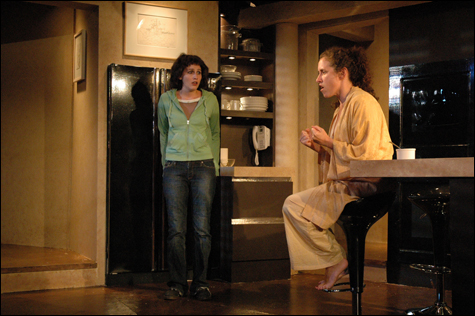
Amanda Collins and Cait Langstaff |
Life is but a dream — or so Rinne Groff’s What Then (at Wellfleet Harbor Actors Theater Harbor Stage through September 2) would have us believe. In this enigmatic work, the author of The Ruby Sunrise gives a sci-fi treatment to the ecologically blighted environment of our future in which a solution is snoozed into being. Or perhaps, given the desolation to be wrought by climate change, the compounding toxicity of the air and the water, and the even more extreme dysfunction of family, Groff means to suggest that the dream state will one day be the only place on the planet safe for human habitation.
Under the smart direction of Rand Foerster, What Then has opened at the old waterfront home of Wellfleet Harbor Actors Theater — now called the Harbor Stage to distinguish it from the new Julie Harris Stage. Set in a sleek beige, black, and stainless-steel suburban kitchen designed by Jackie Levinson, the play is focused on Diane, an accountant who has just quit her job, and her husband, Tom, a corporate executive with a locked black briefcase that hides the damning doings of his malevolent-sounding company. The mess that civilization has made lies outside the kitchen window, where nothing green grows in a barren landscape under a sunless sky. Tom is skeptical of Diane’s change of profession — she’s engaged in a sort of architecture that requires her to work at home, in her pajamas. It seems she’s constructing a beautiful new development, complete with gardens of tomatoes to leach the poison from dead soil, but her work progresses only when she’s sleeping, sometimes 14 hours at a stretch.
Enter Sallie, Tom’s daughter from his first marriage, who demands every kind of help, from drug rehab to a safe place to live. And then Sallie’s boyfriend, an immigrant drug dealer and jack-of-all-trades named Tomashevsky, falls for Diane, with her vision of a restored earth and her sexually provocative manner of mouthing cannoli. (Think porn film shot at Mike’s Pastry on Hanover Street.) The needs of these characters collide and then ricochet off one another’s psyches, resolving in the lyrics of a stand-up karaoke number that enlivens but does not explain the melodramatic ending.
Still, Groff’s drama evokes a mystifying mix of newspaper headlines and other literary and dramatic works ranging from Thornton Wilder’s The Skin of Our Teeth to all of those end-of-the-world flicks. And the members of the WHAT cast are appealing enough to rescue the muddled if intriguing evening. Cait Langstaff, as the latter-day prophetess, makes palpable the urgency of Diane’s dreams. Michael Balcanoff is alternately angry and befuddled as the clueless Tom, who just wants a normal middle-class existence free from guilt for his corporate sins against humanity. Amanda Collins is a waif-like Sallie with expressive eyes and a steely determination to get her due. And Lewis D. Wheeler makes Tomashevsky a homeless Orpheus of abandoned hope.